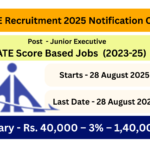Engineer Day 2025
Engineers’ Day 2025: Today Engineers day celebrated in India on Monday, 15 September 2025, honouring the birth anniversary of Sir Mokshagundam Visvesvaraya, one of India’s foremost engineers and Bharat Ratna awardee is remembered this day.
We will understand his work in engineering and his contribution to India. His work at the bottom of this article.
Sir Mokshagundam Visvesvaraya conferred the title of “Sir” in 1915, when he was knighted as Knight Commander of the Order of the Indian Empire (KCIE) by King George V for his outstanding engineering achievements and public service

Events main attraction
- Engineers’ Day falls every year on 15 September across India, marking the birthday of Sir M. Visvesvaraya, who was born in 1861.
- The day recognises the crucial role engineers play in nation-building, infrastructure, technology, and daily life.
- A classic and widely-recognised photo of Sir Mokshagundam Visvesvaraya is featured on the 1960 commemorative Indian postage stamp issued for his 100th birthday.
Theme for 2025
- The theme for Engineers’ Day 2025 is: “Deep Tech & Engineering Excellence: Driving India’s Techade”.
- This theme highlights advances like artificial intelligence, robotics, quantum computing, and the pursuit of engineering excellence to propel India’s growth into a new technology era.
Celebration and Legacy
- Various engineering institutions, colleges, and organisations celebrate throughout India, inspiring young minds toward engineering careers.
- Sir M. Visvesvaraya’s work involves innovations in irrigation, flood management, and infrastructure, as well as his service as Dewan of Mysore and his influence on economic planning in India.
Social Impact
- Engineers’ Day serves not only as a tribute to Visvesvaraya’s legacy but also to appreciate all engineers whose creativity shapes society.
- Popular greetings and tributes circulate on social media and in educational and professional circles to honor the achievements and contributions of engineers nationwide
Visvevaraya’s Contribution
We must discuss the contribution of Visveraya’s contribution to India and Engineering and his work spans landmark engineering feats, industrialisation, and nation-building.
His most notable contributions include pioneering irrigation, water management, and infrastructure projects that have shaped modern India.
Early Life and Education
- Visvesvaraya was born on September 15, 1861, in Muddenahalli, Kingdom of Mysore (now Karnataka), into a Telugu-speaking family.
- After primary schooling in Bangalore, he completed a Bachelor of Arts from the University of Madras and earned a diploma in Civil Engineering from the College of Engineering, Pune.
Engineering Career
- He began as Assistant Engineer in the Bombay Public Works Department in 1885, serving in places like Nasik, Khandesh, and Pune.
- Visvesvaraya implemented the “Block System” of irrigation and developed innovative automatic floodgates for dams, first installed at Khadakvasla Dam in Pune in 1903.
- He was instrumental in solving major engineering problems—
- designed waterworks in Sukkur, improving Visakhapatnam port’s erosion defence, and introducing flood protection in Hyderabad.
Service and Achievements
- Visvesvaraya served as Chief Engineer of Mysore and later as the 19th Dewan (Prime Minister) of Mysore from 1912 to 1918.
- As Dewan, he modernized Mysore with major infrastructure projects: dams, railways, irrigation canals, and public services.
- Founded the Government Engineering College in Bangalore (now University Visvesvaraya College of Engineering) in 1917.
Awards and Recognition
- He was knighted as Knight Commander of the Order of the Indian Empire (KCIE) by King George V.
- In 1955, he received Bharat Ratna, India’s highest civilian honor.
- September 15th, his birthday, is celebrated as Engineer’s Day in India, Sri Lanka, and Tanzania.
Legacy
- Often called “the Father of Modern Mysore,” Visvesvaraya remains an icon in engineering and public service.
- His “Visvesvaraya Plan” (Planned Economy in India) was an important early advocacy of economic planning.
Innovations and Engineering Projects
- Invented the Automatic Water Floodgates, patented and implemented first at Khadakwasla reservoir in Pune (1903), later used at Tigra Dam (Gwalior)
- Krishna Raja Sagar Dam (Mysore). These gates revolutionised dam safety and water management.
- Developed the Block System of Irrigation (1899)
- It provides equitable irrigation benefits across villages, significantly advancing agricultural productivity.
- Was responsible for solving water quality issues in Sukkur (current Pakistan)
- And designed water supply and drainage solutions for Aden (Yemen), showcasing global impact.
Major Infrastructure Achievements
- Chief Engineer and architect of the Krishna Raja Sagar (KRS) Dam, which created Asia’s largest reservoir and transformed irrigation, drinking water supply,
- A hydroelectric power generation in Karnataka.
- Designed the flood protection system for Hyderabad, saving the city from devastating floods caused by the Musi River.
- Played a role in the protection of Visakhapatnam port from sea erosion and the location planning of the Mokama Bridge over the Ganga.
Institutional and Economic Development
- Mysore soap
- As Dewan of Mysore (1912–1918), led industrialization by establishing key institutions: Mysore Soap Factory, Mysore Iron & Steel Works,
- Bangalore Polytechnic, State Bank of Mysore, and the Government Engineering College (now University Visvesvaraya College of Engineering).
- Advocated economic planning in India through the “Visvesvaraya Plan” and authored influential books on economic development (“Planned Economy in India” and “Reconstructing India”).
Vision and Legacy
- Promoted modern scientific and engineering principles, technical education, and private investment, inspiring generations.
- Sir Visvesvaraya’s work created lasting infrastructure, institutions, and approaches that continue to serve India’s engineering, agricultural, and industrial growth
We wish all the engineers and future engineers all the best






